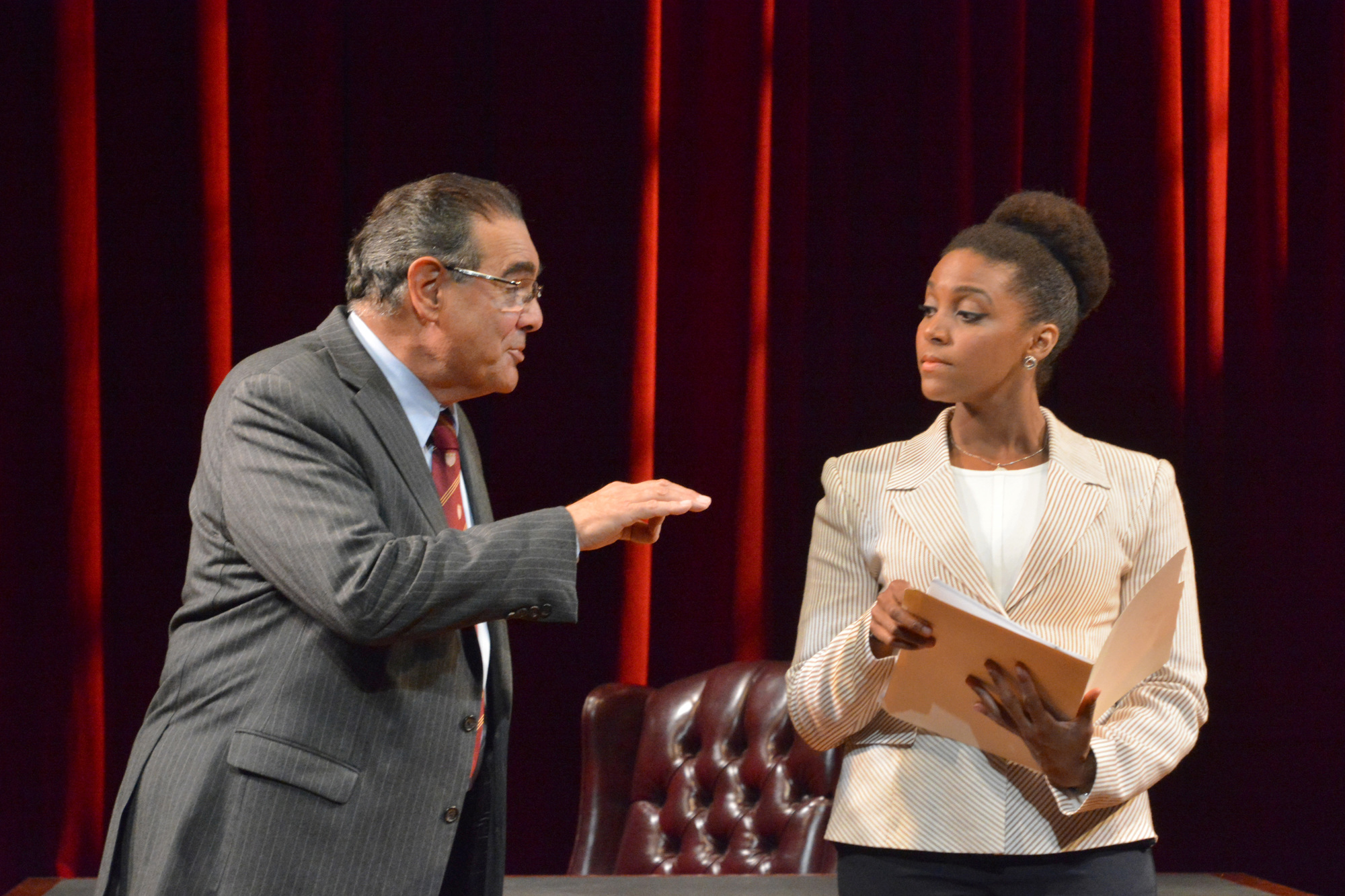- May 17, 2024
-
-
Loading

Loading

John Strand’s “The Originalist,” The Asolo Rep’s latest production, explores the life, opinions and dissents of Antonin Scalia, the late Supreme Court Justice and originalist. What exactly is an originalist?
As the play opens, Justice Scalia (Edward Gero) helpfully supplies a definition. Liberal legal theorists believe in a living constitution; originalists believe in a dead one. (He prefers the term “enduring.”) In other words, “It means today not what current society, much less the court, thinks it ought to mean, but what it meant when it was adopted.”
Scalia supposedly delivers these fighting words to an auditorium of law school students. One talks back — a bleeding-heart liberal named Cat (Jade Wheeler). The Q&A’s supposed to come at the end, but she keeps interrupting him. It turns out that Cat wants to be one of Scalia’s law clerks. To her surprise, he takes her on.

For the rest of the play, Scalia becomes the fictional law clerk’s mentor and sparring partner. (Intellectual, only.) Cat’s also a handy form of opposition research. “Every once in awhile, I like to have a liberal around,” he says. “It reminds me how right I am.” Despite Scalia’s vitriolic reputation, the debate is surprisingly civil. It revolves around a handful of hot-button issues, including affirmative action, abortion rights, the death penalty, the Second Amendment and same-sex marriage. Despite her sexual orientation, Cat works on a rough draft of Scalia’s dissent on a case involving the last issue. The landmark case was United States v. Windsor (2013). That court’s decision overturned the Defense of Marriage Act (DOMA). Cat swallows her pride and advances a position she opposes. But she does get Scalia to soften his language. Slightly.
The talk is tough but never ugly. Scalia has a few moments of operatic high dudgeon; Cat occasionally shows her claws. But most of the discussion is collegial.
In the play’s fictional universe, Scalia intends to mold Cat in his image. (Think “My Fair Law Clerk.”) It doesn’t work that way. Opinions remain intact on both sides. Though Scalia does manage to pass on a few tips regarding the idiosyncrasies of both the semiautomatic AR-10 assault-style rifle and Richard Strauss’ “Ariadne auf Naxos.”

As Monty Python pointed out, “An argument is a connected series of statements to establish a definite proposition.” The bulk of the play is argumentative; a series of logical punches and counterpunches delivered by Scalia and Cat.
Director Molly Smith (who helmed Arena Stage’s original production of “The Originalist”) keeps a laser-beam focus on the point-counterpoint dialog. For this material, it’s the perfect approach. “The Originalist” would work as a radio drama with minor changes. As Smith plays it, you could close your eyes and still appreciate it. Though, why would you want to?

Gero’s Scalia is a charmer and a showman — a world-class wit, with the intellect to back it up. His opponents see him as a monster — a reputation he pretends to enjoy. But there’s nothing monstrous about him. A fine, multifaceted performance. (Gero, it should be noted, originated the role.) Wheeler’s Cat is feisty and quick on her feet. She ducks Scalia’s jabs and gets in a few good licks of her own. It’s a tad improbable, even for a gifted law clerk. But she’s always fun to watch. Brett Mack briefly appears as Brad, Cat’s bitter fellow law clerk. He chafes at the presence of a liberal mind in the conservative Holy of Holies. Obnoxious, but that’s the character’s job. On “The Office,” he’d be Dwight Schrute.
The play’s stripped-down, semiotic sparring comes to life with minimalist sets and costumes by Joseph P. Salasovich and Misha Kachman. How does the bout end?
Inconclusively. As in real life, Scalia’s battle is cut short. Death silenced him, where the greatest minds of his generation couldn’t. (Ironically, Scalia died at a high-tech gun range in Texas.)
The case of Scalia v Cat never reaches a verdict. Each side makes a convincing case, but no minds are changed. (Granted human nature, that probably applies to the audience as well.) If anything, “The Originalist” makes a case for civil debate without ad hominem attacks. The play decides in favor of logic, precedent and respect, and finds against emotion, agenda and contempt.
Case closed.